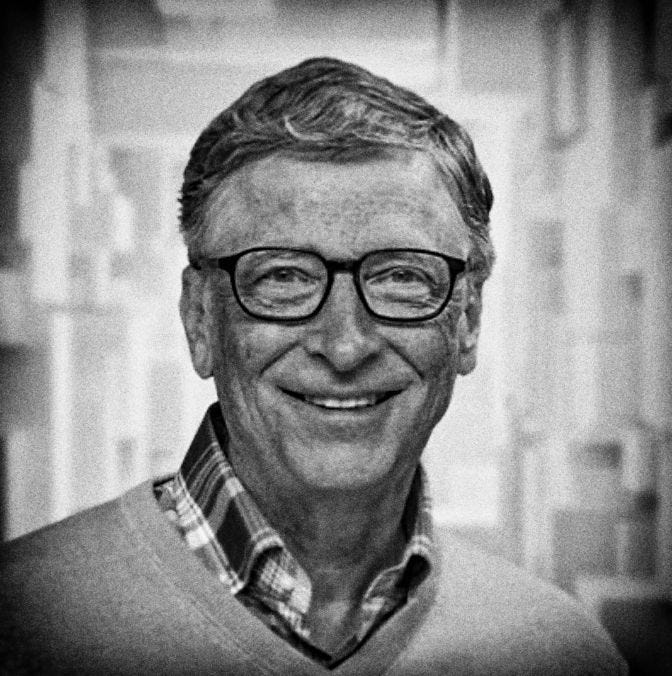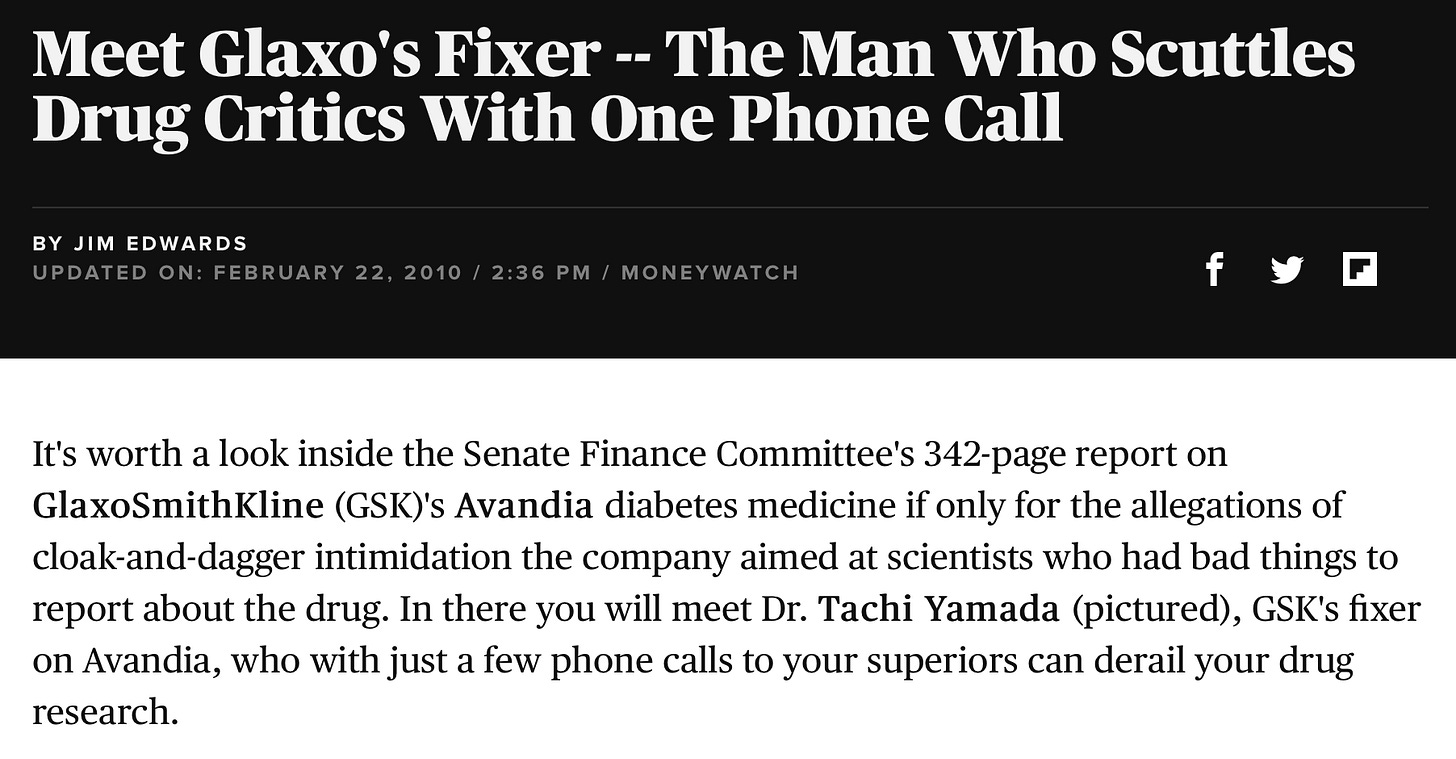I Never Trusted Bill Gates, Nor Should You
While leading a Senate investigation, I tracked a corrupt pharmaceutical executive right into the lobby of the much-vaunted Bill and Melinda Gates Foundation—Bill Gates did nothing.
The last year has not been kind to Bill Gates.
For two decades, Gates has shoveled out buckets of cash through the Bill and Melinda Gates Foundation to transform himself from despised 1990’s software monopolist to a present-day public health intellectual—a miraculous, money-fueled metamorphosis. But that reputational makeover has stumbled, as a series of critical articles have tarnished Gates’ paid-for golden image and cast doubt on his credibility. However, long before these articles came to light, I already knew that Gates could not to be trusted.
A decade ago, I led a Senate investigation into a multi-billion-dollar diabetes drug sold by GlaxoSmithKline (GSK) that government scientists found to have caused around 83,000 heart attacks. During this federal investigation, I uncovered multiple examples of GSK officials intimidating medical experts who decried the drug’s dangers. A leader in this campaign was GSK’s chairman of research and development, Dr. Tadataka (Tachi) Yamada.
By the time our committee uncovered GSK’s coercion campaign, Yamada had left the company to run Gates’ global health program. And yet, as the media outlets reported on Yamada’s prior role bullying physicians who tried to warn about the drug’s dangers, the Gates Foundation ignored this public outcry and allowed Yamada to maintain his pulpit as global health protector.
Twenty years back, journalists scrutinized Gates’ foundation as a vehicle to enrich himself and polish his appearance. But over the years, reporters began to forget Gates’ past and provide him a platform to puff himself up as scientific expert, despite his having no medical or scientific credentials. Bill Gates’ sculpted persona as health policy guru began to wobble last summer, however, precisely because of revelations showing the tools he had used to improve his media cachet.
In August 2020, Tim Schwab published an article in the Columbia Journalism Review exposing around $250 million in grants that Gates was throwing at journalism outlets including the BBC, NBC, Al Jazeera, ProPublica, National Journal, The Guardian, Univision, Medium, the Financial Times, The Atlantic, the Texas Tribune, Gannett, Washington Monthly, Le Monde, and the Center for Investigative Reporting.
A later article in The Nation spotlighted Gates’ potential to profit from investments in companies situated to reap a windfall from the COVID pandemic. And another report in The Nation found that Gates’ funding has stifled debate in public health—described as “the Bill chill”—as organizations are reluctant to bite the hand that feeds them.
These revelations came as little surprise to me. Back in 2007, I was working as an investigator for the Senate Finance Committee and learned first-hand that Bill Gates does not put the public first. That year, I wrote the Senate Finance Committee’s report showing that, shortly after the GSK diabetes drug Avandia came on the market in 1999, the company attacked and silenced several scientists including Dr. John Buse, a professor of medicine at the University of North Carolina.
GSK began to bully Dr. Buse after he gave talks stating that Avandia might increase cardiovascular problems such as heart attacks. By the time we released the 2007 report, FDA scientists estimated that Avandia had caused approximately 83,000 heart attacks.
When Dr. Buse began warning physicians about the drug, Dr. Yamada was at GSK and contacted Dr. Buse’s department chairman to complain. In an email discussing Dr. Buse with GSK’s CEO and other executives, Dr. Yamada wrote:
In any case, I plan to speak to Fred Sparling, his former chairman as soon as possible. I think there are two courses of action. One is to sue him for knowingly defaming our product even after we have set him straight as to the facts—the other is to launch a well planned offensive on behalf of Avandia....
In our report, we released a private email that Dr. Buse later sent a colleague detailing this encounter with GSK:
[T]he company’s leadership contact[ed] my chairman and a short and ugly set of interchanges occurred over a period of about a week ending in my having to sign some legal document in which I agreed not to discuss this issue further in public.
Dr. Buse ended the email, “I was certainly intimidated by them.... It makes me embarrassed to have caved in several years ago.”
Multiple media outlets covered Yamada’s actions, including The Guardian (GSK accused of trying to intimidate critic), NBC News (Diabetes drug probe leads to Gates Foundation), and even Bill Gates hometown newspaper, the Seattle Times (Senate committee turns attention to Gates Foundation official).
Months prior to the report’s release, The New York Times also detailed Dr. Yamada’s behavior (Doctor Says He Was Assailed for Challenging Drug’s Safety), as some initial evidence came to light during a hearing in the House.
In response to all this outcry, Bill Gates did... nothing.
To put this matter directly under Bill Gates’ nose, I then wrote the Senate Committee’s letter demanding that Dr. Yamada come and brief Senate investigators. Just in case Gates was too distracted with saving the world and playing public health saviour to have noticed the bad press, I had the letter sent directly to the Gates Foundation.
When Dr. Yamada showed up for his appointment in Senate Hart, we started with some brief niceties and formalities—typical DC nonsense such as shaking hands, passing out business cards, asking how the plane flight was—before getting down to business. Dr. Yamada’s lawyer then pulled from his briefcase a marked-up copy of a Committee report I had written titled: The Intimidation of Dr. John Buse and the Diabetes Drug Avandia.
We spent about twenty minutes going over the report, as the lawyer explained what Dr. Yamada had done. He then turned the matter over to Dr. Yamada to detail why, many years prior, he had called Dr. Buse's superiors at the University of North Carolina.
As Dr. Yamada explained, he wasn't trying to intimidate anyone. Ironically, he even offered up the idea that he had called Dr. Buse's dean at North Carolina, because he was concerned that Avandia might actually be harmful. And if the drug was harmful, Dr. Yamada said, he wanted to know.
I almost giggled when he said that.
I then asked, "So this is the only time that you can remember calling a university about one of their faculty?"
"Yes," he replied.
I let him drone on some more, explaining medical research, before I asked him again if he had ever called a university to complain about a professor. Again, he denied doing so, and then started explaining drug development and the regulatory process at the FDA.
I then asked again, "So during all your time at GSK, this is the only incident you can remember where you placed a call to a university about a researcher who raised concerns about one of your products, correct?” I asked. “It was a singular incident in your time at the company?”
"Yes," he said.
This was the third time that Dr. Yamada had denied making calls to other universities to intimidate academics speaking up about Avandia. I then pulled out copies of GSK emails, showing that Dr. Yamada had called the University of Pennsylvania about physicians there who were worried about drug’s dangers.
“Would you like to explain to us about the call you made to the University of Pennsylvania?” I asked. “One of the physicians involved told me, 'It left a really bad taste in my mouth. After that happened, I said that I would never work for a drug company.’ Another physician who was involved told me, 'It’s the kind of thing you imagine happening on TV.'’’
I then slid the emails across the table to him. Dr. Yamada’s attorney jumped up and grabbed the emails saying, “These emails weren't in the report!”
“No shit, Counselor,” I thought. “I left these ones out, to see if your client might lie to us. Calm down. Everything's going to be A-O-K....”
We then exchanged some more niceties as Yamada “reexplained himself.” Oddly enough, it seems there may have been more than just that one incident at North Carolina, Dr. Yamada said. But I really wasn't interested in listening and started checking my Blackberry.
It took a couple more years to go through hundreds of thousands of GSK’s internal documents before we released our final 342-page report in 2010 titled: Staff Report on GlaxoSmithKline and the Diabetes Drug Avandia. But we redacted the names of the scientists at the University of Pennsylvania who Dr. Yamada had harassed for speaking up, because they were still scared about possible retaliation from the drug industry.

After reading the report, Yale cardiologist Harlan Krumholz wrote that it "read like a spy novel.” Analysts at UBS predicted that GlaxoSmithKline could face legal liability of up to $6 billion. The New York Times covered the report on its front page and the CBS News put Yamada in its story’s headline: Meet Glaxo's Fixer -- The Man Who Scuttles Drug Critics With One Phone Call.
And still, Bill Gates did nothing.
Five months after the 2010 Senate Finance report, GSK agreed to a $460 million settlement with 10,000 Americans who sued the company for withholding Avandia’s heart attack risks. The New York Times editorialized that GSK and its leaders “can’t be trusted to report adverse clinical results fairly.”
Nothing at all happened to Yamada. He remained in his role as global health expert at the Gates Foundation, until he left the following year, in June 2011.
Keeping someone like Yamada to run a global health program has always made me doubt Bill Gates’ commitment to public health. How could anyone have faith in Gates’ judgement after watching him stand idly by as a stream of evidence proved that one of his top lieutenants had a history of corrupt behavior?
Since that time, I have never trusted Bill Gates. And neither should you.










https://www.mdpi.com/2078-1547/10/1/24; my peer reviewed paper: "Philanthrocapitalism: Promoting Global Health but Failing Planetary Health" describes other failings of the Gates Foundation (2019)
Now look into the role of the Gates Foundation in pushing the circumcision of 23 million African men, based on the claim that it protects them against HIV/AIDS. The claim was based on studies with numerous flaws, detailed in a paper called "A New Tuskegee?" in Developing World Bioethics Sept 2020
Cutting men may only protect them somewhat from infection from women, while it may increase the risk TO women, already at much greater risk.
https://onlinelibrary.wiley.com/doi/abs/10.1111/dewb.12285?fbclid=IwAR1cu2zm4qdvjx15prwYIGHqk8fYSeATvYtfZQTKM7Qse7u2inWVfqxZdIQ